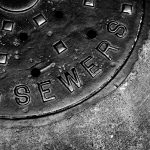A backed-up sewer is every homeowner’s nightmare. From foul odors to messy (and costly) damage, sewer problems can escalate quickly if not addressed right away. But if you know the early warning signs and how to respond, you can limit the damage and get your plumbing back on track faster.
Let’s walk through what to watch for, what to do when your sewer backs up, and how to prevent it from happening again.
Signs Your Sewer is Backed Up
Sometimes a sewer backup doesn’t come with dramatic flooding—at least not right away. There are usually a few subtle signs that something is wrong. For example:
- Slow drains throughout the house (not just in one sink or tub).
- Gurgling sounds from your drains or toilet.
- Water is backing up into other drains when you flush the toilet or run a faucet.
- Foul smells are coming from your drains.
While these may seem small and insignificant, you shouldn’t ignore them as they can lead to far bigger—and more disastrous—issues in the future.
What to Do When Your Sewer Backs Up
When a sewer system becomes overloaded or blocked, it can force wastewater and raw sewage to reverse course and enter your home. Instead of being safely carried away, the contaminated water can overflow from toilets, sinks, and drains, spreading throughout your living space and possibly leading to serious property damage.
If you notice a backup, stay calm and take the following steps to minimize damage and protect your home.
Turn Off the Water
Stop using water in your home immediately. That includes faucets, toilets, dishwashers, washing machines—everything. If it’s safe to do so, go ahead and shut off your home’s main water valve to prevent additional water from making the situation worse.
Turn off the Electricity in Area
Water and electricity can be a dangerous mix. If there’s standing water near electrical outlets, appliances, or your breaker box, cut the power to the area to avoid the risk of shock or fire. Do not walk through water to access your breaker—call a professional if needed.
Wear Protective Gear
If you’re going anywhere near the waste, be sure to wear proper protective gear to protect yourself from harmful bacteria and contaminants in the sewage. At a minimum, you should wear:
- Rubber gloves (elbow-length, if possible)
- Rubber boots
- Safety goggles or a face shield
- A mask or respirator rated for biohazard cleanup
- Disposable coveralls or old clothes that can be thrown away
Avoid touching your face during cleanup, and be sure to wash your hands thoroughly when finished. Once the job is done, disinfect all tools and equipment—and don’t bring anything contaminated back into your living areas.
Call a Plumbing Professional
Sewer issues aren’t something you want to DIY. Call a licensed plumber with experience handling sewer backups. They’ll be able to assess the damage, locate the cause, and safely make the necessary repairs.
Carefully Cleanup
Sewer water is considered a biohazard and can contain harmful bacteria and contaminants. If you choose to clean up yourself, you need to do so very carefully. Again, be sure to wear protective gear when going near the biohazardous material. Use proper disinfectants, and dispose of any contaminated materials properly. In many cases, it’s safest to hire a professional cleanup crew to handle the job.
Common Causes (& How to Prevent Them)
Wondering why your sewer backed up in the first place? Here are some of the most common reasons—plus a few prevention tips:
Aging Pipes
Old sewer lines can corrode, crack, or collapse over time. If your home is older, consider having your sewer line inspected and potentially replaced if needed. This is best done by an experienced professional plumber.
Leaks or Cracks
Small cracks can turn into big problems, allowing roots, dirt, or debris to enter the pipe. If you see signs that you have leaks in your pipes—such as higher water bills, unusual sounds, or reduced water pressure—have a plumbing professional check it out and fix the problem before it develops into something bigger.
Clogs
Grease, hair, paper towels, and hygiene products can cause major blockages. Never pour fats or oils down the drain, and be cautious about what you flush.
Tree Root Infiltration
Roots can grow into tiny cracks in your pipes, eventually causing a major obstruction. If you have large trees near your sewer line, regular inspections can help catch root problems early.
Flooding or Excess Water
Heavy rain, poor drainage, or oversaturated soil can overwhelm your sewer system. While you can’t control the weather, maintaining your gutters and grading your yard properly can help reduce the risk.
Don’t Wait—Act Fast
A sewer backup isn’t just gross—it’s dangerous for your home and your health. Knowing what to do when your sewer backs up and acting quickly can save you thousands of dollars and a lot of stress. If you think your sewer is backing up, follow these steps and call a professional as soon as possible.
Have more questions about sewer line problems? Contact your local plumbing experts—they’re here to help when things go sideways underground.
At Ciriello Plumbing, we promise expertise, honesty, and efficiency to the homes and businesses we service in Greater Indianapolis, including Carmel, Fishers, & Greenwood. From residential plumbing repairs to commercial installations, our expert team is dedicated to providing exceptional craftsmanship and unparalleled customer service. For reliable plumbing services you can trust, contact Ciriello Plumbing Solutions today.







